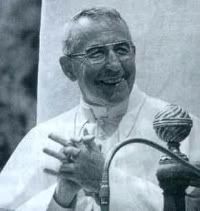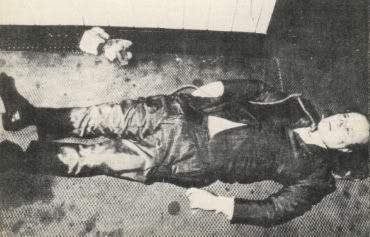I posted this a couple of months ago here, from my blog, and thought this would be a good time to repost it."My God - they killed him!" The streets are filled with vipers who've lost all ray of hope
You know it ain't even safe no more in the palace of the Pope
- Bob Dylan
Is everything a conspiracy? No. Just the important stuff.
Since there's a lot of speculation these days about who will succeed Pope John Paul II, it seems a good time to recall the circumstances of the last papal succession. Because Luciani Albini, Pope John Paul I, was almost certainly murdered, by an international network of fascists and money launderers, with ties to far-right elements within military and intelligence agencies. (And isn't it just amazing, how often we find that convergence?)
He only served 33 days; what could he have done in that short time to deserve death? What kind of Pope was he becoming?
To the second question, there's the suggestion of an answer in this passage from David Yallop's
In God's Name:
On August 28, the beginning of his papal revolution was announced. It took the form of a Vatican statement that there was to be no coronation, that the new pope refused to be crowned. There would be no sedia gestatoria, the chair used to carry the pope, no tiara encrusted with emeralds, rubies, saphires, and diamonds. No ostrich feathers, no six-hour ceremony.... Luciani, who never once used the royal "we," was determined that the royal papacy with its appurtenances of worldly grandeur should be replaced by a Church that resembled the concepts of its founder. The "coronation" became a simple Mass. The spectacle of a pontiff carried in a chair...was supplanted by the sight of a supreme pastor quietly walking up the steps of the altar. With that gesture Luciani abolished a thousand years of history.... The era of the poor Church had officially begun.That right there would have been enough to make the Vatican's power elite nervous, but surely not enough to seek the Pope's death. Not even his expressed interest in reconsidering the Church's position on birth control would have been enough for that. What was enough, was his intent to overturn the tables of the corrupt Vatican Bank, and purge the Vatican of the P2 Lodge.
This is one of those things that make being a "conspiracy theorist" seem entirely superfluous. Just try imagining P2: an elite, ultra-secretive, neo-fascist, Masonic cabal, involved in money laundering, assassination and false-flag terrorism. (The "Strategy of Tension," to discredit Italy's Communist Party. For instance, the engineering of Aldo Moro's kidnapping and murder, and the Bologna train bombing.) P2 counted among its members the future Italian President Silvio Berlusconi, and reputedly boasted honourary members like Henry Kissinger, George HW Bush and arch-neocon, Michael Ledeen.
I
mentioned P2 last August, with regard to Ledeen's long history with the Italian far right and the linchpin of Italian military intelligence to the Niger "Yellow Cake" forgery. (For more on the significance of P2 to US intelligence and the "Octopus," refer to David Guyatt's excellent articles
"Operation Gladio",
"Holy Smoke and Mirrors" and
"The Money Fountain.")
Licio Gelli was P2's Grandmaster, and can't even be called a
neo-fascist. He was Old School: a member of the Italian Black Shirt Brigade which fought for Franco in the Spanish Civil War. During World War II, he spied on partisans in his native Italy for the Nazis, and obtained the SS rank of
Oberleutenant. This same Gelli was a honoured guest of George HW Bush after the 1980 inauguration, and there is evidence that Gelli and P2 played a role in the October Surprise; even that Swedish Prime Minister Olof Palme was murdered on Gelli's orders because he'd refused to provide Swedish cover for the covert transfer of money and arms. In her
October Surprise, Barbara Honegger writes that a P2 informant claimed to her that before Palme's death, Gelli sent a message to former Republican National Committee advisor (and also alleged "honourary" P2 member) Philip Guarino, assuring him that "the Swedish tree will be felled," and to "tell our good friend Bush."
Your head exploding yet? There's more. GHW Bush's reputed code name for October Surprise was "The White Rose," which was also the name of a far-right Cuban exile group with which the CIA's Bush was reportedly engaged during the ramp-up to the Bay of Pigs. Honneger reports that when Italian police uncovered the P2 control cell responsible for terrorism in Italy, they learned that its code name was "The Rose of Twenty." Gelli seems to have had a weakness for the flower.
And this may mean nothing, or I know what you did: In 1988, on the 25th anniversary of John F Kennedy's murder, Ted Kennedy marked the occasion in Runnymede England by placing, at the foot of his brother's memorial, a single white rose.
Gelli's network financed itself in part by purchasing and plundering banks, thanks to the likes of P2 brothers Michele Sindona and "God's Banker," Roberto Calvi. Mafioso Sindona, in 1968, had become a financial advisor to Pope Paul VI; Calvi was running Banco Ambrosiano; and another P2 member, American Bishop Paul "You can't run the Church on Hail Marys" Marcinkus, who bore the nickname "the Gorilla," was heading the Vatican Bank. For a while, it was a sweet operation.
Clockwise, from top right: Calvi, Marcinkus, Sindona and Gelli
As cardinal of Venice, Albini had butted heads with the bankers. As Pope, he could finally do something more. Most revelatory, he became privy to the secret list of Freemasons in the Vatican. For the first time, he learned of P2's penetration of the Church.
Yallop again:
If the information was authentic, then it meant Luciani was virtually surrouded by Masons.... The secretary of state, Cardinal Villot, Masonic name Jeanni, lodge number 041/3, enrolled in a Zurich lodge on August 6, 1966. The foreign minister, Monsignor Agnostino Casaroli. The cardinal vicar of Rome, Ugo Poletti. Cardinal Baggio. Bishop Paul Marcinkus and Monsignor Donato de Bonis of the Vatican Bank. The disconcerted pope read a list that seemed like a Who's Who of Vatican City.Here's a good
summation of what happened next:
With his bright intelligence and naive fearlessness, John Paul I penetrated to the heart of this maze of corruption within weeks of his coronation. On the evening of September 28, 1978, he called Cardinal Villot, the leader of the powerful Curia, to his private study to discuss certain changes that the Pope proposed to make public the next day.... Among those whose "resignations" would be accepted by the Pontiff the following day were the head of the Vatican Bank, and several members of the Curia who were implicated in the activities of Sindona and P2, and Villot himself. Moreover, Villot was told that John Paul I would also announce plans for a meeting on October 24 with an American delegation to discuss a reconsideration of the Church's position on birth control.
When Pope John Paul I retired to his bedroom on the evening of September 28, clutching the paperwork that would expose the Vatican's financial dealings with the Mafia and purge the Curia of those responsible, a number of very ruthless individuals had a great interest in seeing to it that he would never awaken to issue these directives.
When the Pope's housekeeper knocked at his door at 4:30 a.m., she heard no response. Leaving a cup of coffee, she returned fifteen minutes later to find the Pope still not stirring. She entered the bed chamber and gasped when she saw the Pope propped up in bed, still holding papers from the night before, his face contorted in a grimace. On the night table beside him lay an opened bottle of Effortil, a medication for his low blood pressure. The housekeeper immediately notified Cardinal Villot, whose first response to the news was to summon the papal morticians even before verifying the death himself or calling the Vatican physician to examine the body. Villot arrived in the Pope's room at 5:00 a.m. and gathered the crucial papers, the Effortil bottle, and several personal items which were soiled with vomit. None of these articles were ever seen again.
Although the Vatican claimed that its house physician had determined myocardial infarction as the cause of death, to this day no death certificate for Pope John Paul I has been made public. Although Italian law requires a waiting period of at least 24 hours before a body may be embalmed, Cardinal Villot had the body of Albino Luciani prepared for within 12 hours of his death. Although the Vatican refused to allow an autopsy on the basis of an alleged prohibition against it in canon law, the Italian press verified that an autopsy had in fact been performed on one of the Pope's predecessors, Pius VIII. Although the conventional procedure for embalming a body requires that the blood first be drained and certain internal organs removed, neither blood nor tissue was removed from the corpse; hence, none was available to assay for the presence of poison.There's an old Kris Kristofferson song, entitled "They Killed Him." I learned it from a Dylan cover, on almost certainly his weakest album,
Knocked Out Loaded. To be honest, it's pretty lousy. (If you haven't heard it, all you need to know is it has a children's chorus.) And yet, it chills me.
A verse:
Another man from Atlanta, Georgia
By name of Martin Luther King
He shook the land like the rolling thunder
And made the bells of freedom ring today
With a dream of beauty that they could not burn away
Just another holy man who dared to make a stand:
My God, they killed him!My point here hasn't been to rehash the case for assassination. My point, I suppose, is simply my exasperation: that
My God - they killed him, too!This material can lead to despair.
If they can whack the Pope, and get away with it, what hope do we have? I don't find it consoling to know of what they're capable; that they are, as Dylan sang in another song, "bound and determined to destroy all the gentle." That's not about justice. That's about being forewarned, and forearmed. And these days, that's almost as important as justice.
But it is a consolation of sorts to remember that these people are flesh, just as we are. Gelli is still alive, but since his extradition from France in 1998, he has been serving a 12-year sentence for his role in the Banco Ambrosiano affair. Marcinkus received Vatican immunity from Pope John Paul II, when it became apparent Italian authorities intended to prosecute him for his criminal stewardship of the Vatican Bank, and eventually left Rome for Sun City, Arizona. (A fascinating glimpse of Marcinkus today,
here.) Sindona died in prison drinking poison coffee, possibly the same administered to the Pope. Calvi, after his string played out, met a peculiarly Masonic fate, hanging from a rope beneath London's Blackfriar's Bridge, his hands tied behind his back and 12 pounds of bricks stuffed in his pockets. (Naturally, originally deemed a "suicide.")
The suicided Calvi